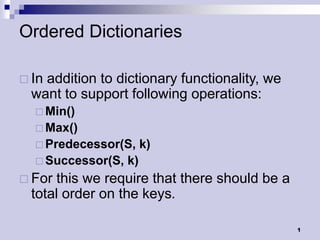
Lec8
- 1. Ordered Dictionaries Inaddition to dictionary functionality, we want to support following operations: Min() Max() Predecessor(S, k) Successor(S, k) For this we require that there should be a total order on the keys. 1
- 2. A List-Based Implementation Unordered list searching takes O(n) time inserting takes O(1) time Ordered list searching takes O(n) time inserting takes O(n) time Using array would definitely improve search time. 2
- 3. Binary Search Narrow down the search range in stages findElement(22) 3
- 4. Running Time The range of candidate items to be searched is halved after comparing the key with the middle element Binary search runs in O(lg n) time (remember recurrence...) What about insertion and deletion? 4
- 5. Binary Search Trees A binary search tree is a binary tree T such that each internal node stores an item (k,e) of a dictionary keys stored at nodes in the left subtree of v are less than or equal to k keys stored at nodes in the right subtree of v are greater than or equal to k Example sequence 2,3,5,5,7,8 5
- 6. Searching a BST To find an element with key k in a tree T compare k with key[root[T]] if k < key[root[T]], search for k in left[root[T]] otherwise, search for k in right[root[T]] 6
- 7. Search Examples Search(T, 11) 7
- 8. Search Examples (2) Search(T, 6) 8
- 9. Pseudocode for BST Search Recursive version Search(T,k) 01 x root[T] 02 if x = NIL then return NIL 03 if k = key[x] then return x 04 if k < key[x] 05 then return Search(left[x],k) 06 else return Search(right[x],k) Iterative version Search(T,k) 01 x root[T] 02 while x NIL and k key[x] do 03 if k < key[x] 04 then x left[x] 05 else x right[x] 06 return x 9
- 10. Analysis of Search Running time on tree of height h is O(h) After the insertion of n keys, the worst- case running time of searching is O(n) 10
- 11. BST Minimum (Maximum) Find the minimum key in a tree rooted at x TreeMinimum(x) 01 while left[x] NIL 02 do x left[x] 03 return x Running time O(h), i.e., it is proportional to the height of the tree 11
- 12. Successor Given x, find the node with the smallest key greater than key[x] We can distinguish two cases, depending on the right subtree of x Case 1 right subtree of x is nonempty successor is leftmost node in the right subtree (Why?) this can be done by returning TreeMinimum(right[x]) 12
- 13. Successor (2) Case 2 the right subtree of x is empty successor is the lowest ancestor of x whose left child is also an ancestor of x (Why?) 13
- 14. Successor Pseudocode TreeSuccessor(x) 01 if right[x] NIL 02 then return TreeMinimum(right[x]) 03 y p[x] 04 while y NIL and x = right[y] 05 x y 06 y p[y] 03 return y For a tree of height h, the running time is O(h) 14
- 15. BST Insertion The basic idea is similar to searching take an element z (whose left and right children are NIL) and insert it into T find place in T where z belongs (as if searching for z), and add z there The running on a tree of height h is O(h), i.e., it is proportional to the height of the tree 15
- 16. BST Insertion Example Insert 8 16
- 17. BST Insertion Pseudo Code TreeInsert(T,z) 01 y NIL 02 x root[T] 03 while x NIL 04 y x 05 if key[z] < key[x] 06 then x left[x] 07 else x right[x] 08 p[z] y 09 if y = NIL 10 then root[T] z 11 else if key[z] < key[y] 12 then left[y] z 13 else right[y] z 17
- 18. BST Insertion: Worst Case In what sequence should insertions be made to produce a BST of height n? 18
